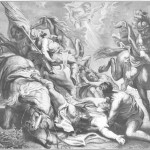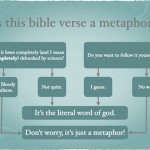Bible reading is both an art and a science. The Holy Scriptures are meant to pierce all of our heart and all of our mind. We cannot neglect the expressive, emotional aspect the Bible carries into our lives. These things are important as we draw nearer in our relationship to Christ. However, we cannot neglect the intellectual and rational minds our God has given us; Christianity is a thinking-man’s religion.
I’m not sure if there isn’t one person who doesn’t struggle with giving either their heart or their mind more weight than it is due. I know this is something I regularly struggle with. On the one hand, we can turn Christianity into a feel-good self-improvement program that is all about positive feelings. With no backbone and having never been encouraged to actually think about the text, people misrepresent or leave the faith in countless numbers.
On the other hand, it is entirely possible to academize and intellectualize the faith. Pursuing only knowledge, people lord their education over others while failing to magnify our great God and apply it to their lives. These are two extremes that we must take care to avoid at all costs.
It is my intention in this post to provide some insight as to how I attempt to avoid either extreme. The things I list in these posts will inform future articles and I will likely reference them often.
1) Everything Must Point to the Gospel
I am so thankful for gospel-centered preaching. It is the food that nourishes, supplies and helps further Christ’s church today. Living in a time post-Christ, we have been gifted and blessed with God’s full revelation in Jesus. Because of this, when we read the Biblical text it is essential we read it in light of the life, death and resurrection of Christ. There is no aspect of the Scriptures that shouldn’t inform our view of Christ in some way.
This is easy for most of the New Testament. The gospels all tell of the life and redemptive work of Christ, and the remaining epistles all continually point back to Christ. The area we struggle with this the most is in the Old Testament. Since this is pre-Christ and often appears to be a series of unrelated stories, we so easily fall into the trap of forgetting the text is all about God-man.
A helpful text for this is Luke 24:27, “And beginning with Moses and all the Prophets, he interpreted to them in all the Scriptures the things concerning himself.” The key words here are all the Scriptures. There isn’t one text in the Old Testament that doesn’t inform us to Christ’s work on the cross, and we must therefore engage all of our faculties in understanding the Old Testament in light of the gospel.
Instead of figuring out what the Old Testament stories tell us about Jesus, our first inclination is to instead read ourselves into the story. So we ask questions like “What does this mean to me today?”or “What does this tell me about God working in my life?” These are healthy questions to ask, and can bear good fruit in our lives. These questions however should not be our starting point.
It is instead necessary for us to first ask Christ-centered questions such as “What does this passage tell me about Christ?” or “Where is Christ in this Old Testament account?” Starting with such questions will diminish our desires to read ourselves into the text, and will instead elevate Christ’s position to its proper place.
There are two examples of this that will be helpful for this discussion. The first of these is the story of Joseph and his brothers. Having been completely abandoned and betrayed by his brothers, Joseph is sold into slavery. The great climax of this story is when Joseph says “As for you, you meant evil against me, but God meant it for good…” (Genesis 50:20). We like this text, and we use it in hard times as reassurance that God will bring us out of whatever hole we are in (pun intended). But is this really the meaning of the text? Is this text about how God will be faithful to us and do good things for us?
On the contrary, this text is centrally and entirely about Christ. It is a shadow of the life and sufferings Jesus will endure on our behalf. Like Joseph, Christ would also come and declare his rightful place among the nations – and be rejected for it. Like Joseph, Christ would be betrayed and abandoned by those closest to him – Judas and the other disciples. Like Joseph, Christ would be restored and elevated amongst the people.
Another common example in the Old Testament would be the account of David and Goliath. We all know how the story goes, the little shepherd boy kills the great Goliath with nothing but a slingshot and a sword (after Goliath is knocked unconscious, of course). Today the temptation is to understand this story as allegory. We read ourselves as David and Goliath as all of our life’s problems! If we are as faithful as David, God will help us overcome our difficulties.
Again, this is not the meaning of the text. Arriving at this conclusion is the result of asking the wrong questions. What does this text tell us about Christ? Where is Christ in this story? Similar to Joseph, David is a shadow of Christ in the Old Testament. We are not David – Christ is. Like David, Christ is the unlikely hero who will fight the battle that we could not fight. Christ takes our place, as did David for the Israelite army. It is crucial that this is our starting point for this story. We no longer read it as what God will do for us, but instead we read it as what God has already done for us through Christ.
Before I wrap this thing up, I must briefly mention our understanding of the New Testament. While it is easier for us to see Christ in the New Testament – especially the gospels – we still often start with me-centered questions. The same Christ-centered and gospel-centered approach must apply to the New Testament.
Helpful for our understanding is a passage again from the book of Luke. Luke records the following comment in his gospel from early on in Jesus’ ministry, “When the days drew near for him to be taken up, he set his face to go to Jerusalem” (Luke 9: 51). In the Gospel of Luke, this is only 9 of 24 chapters into the gospel letter. From the beginning Jesus had a mission, and his mission was to come to this earth to take our place and pay a punishment we deserved in our place. Known as the Fathers “Great Commission” to the Son, the prophet Isaiah records a similar idea centuries before Christ walked the earth: “I will make you as a light for the nations, that my salvation may reach to the end of the earth” (Isaiah 49:6). When we read the New Testament, even in the accounts in the gospel letters prior to the crucifixion, we must read and understand the text in light of the gospel.
That’s all for today. I quickly realized while writing this that what I intended to be one post must be broken up into four or five posts. Come back tomorrow for more thoughts on how I (try to) read my Bible.







